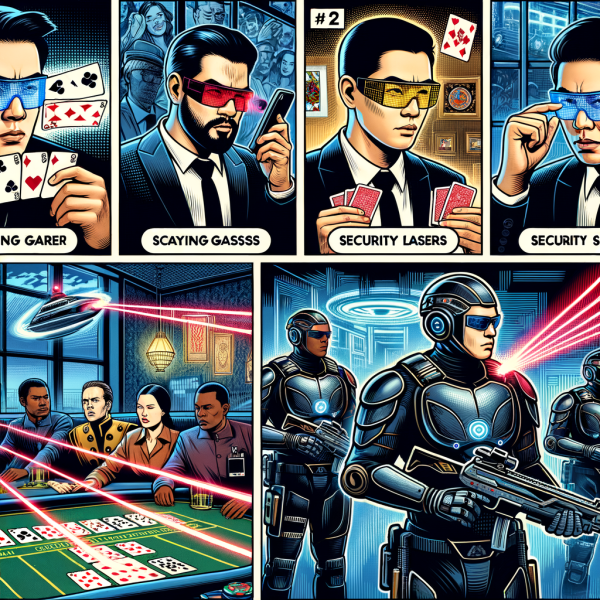Introduction: The Rise of Smart Glasses in Gambling
In recent years, smart glasses have transformed the landscape of technology, offering users an interactive and immersive experience in various fields including gaming and gambling. These devices, equipped with augmented reality (AR) and connected features, have caught the attention of numerous industries, sparking debates about their implications. In the gambling sector, the potential for abuse raises concerns about integrity and fairness in casino environments. With the rise of smart glasses, the question emerges: could these devices become the next tool for casino cheaters?
The allure of casinos lies in the thrill of chance, but the potential for technological manipulation introduces a new dimension to this excitement. Smart glasses can provide real-time data and analytics, enabling users to gain an unfair advantage over the house. As this technology continues to evolve, so too does the sophistication of potential cheating methods. Understanding how these devices operate and what benefits they may offer to unscrupulous players is crucial in assessing their impact on the gambling industry.
Moreover, the integration of smart glasses into gambling contexts not only raises ethical questions but also challenges the traditional methods of surveillance and security employed by casinos. The gaming industry must adapt to these advancements by adopting new strategies to maintain a fair playing environment. The rise of smart glasses is not just a technological phenomenon; it is also a pivotal moment in the ongoing battle between innovation and regulation in gambling.
This article aims to explore the implications of smart glasses in casino settings, discussing both their potential advantages for cheaters and the subsequent legal and ethical ramifications. Furthermore, it will highlight the proactive measures that casinos are likely to implement to counteract these emerging threats.
Understanding the Technology Behind Smart Glasses
Smart glasses are wearable devices that incorporate displays, cameras, sensors, and connectivity features, allowing users to interact with digital information while maintaining awareness of their surroundings. These glasses can overlay information onto the real world, making them particularly appealing for applications in gaming settings. Equipped with advanced processors and software, smart glasses can deliver real-time insights and enhance the player’s experience, but this capability also opens avenues for misuse.
For instance, many smart glasses utilize facial recognition technology and can analyze the behavior of other players at a table. This can allow a cheater to identify patterns and weaknesses in the gameplay of others. Additionally, smart glasses can be programmed to display calculated odds or suggested moves based on ongoing hands, thereby providing the wearer with an unfair advantage.
The technology behind smart glasses is constantly evolving, with developments in machine learning and data analytics paving the way for more sophisticated applications. As these devices become increasingly accessible and affordable, their potential for misuse in casino settings will likely rise. Understanding the capabilities of smart glasses is essential for recognizing their potential impact on gambling practices.
As the gambling industry adapts to these technological advancements, operators must remain vigilant about how these devices can be employed. By staying informed about the technology, casinos can better understand the implications of smart glasses and prepare for potential disruptions in their security frameworks.
Potential Advantages for Cheaters in Casino Settings
The advantages offered by smart glasses in a casino context can be both enticing and significant. One of the primary benefits is the ability to process and display real-time data, which can dramatically enhance decision-making in games like poker or blackjack. A player wearing smart glasses can receive information on opponents’ tendencies or the likelihood of certain outcomes based on previous gameplay.
Additionally, smart glasses can facilitate communication between players engaged in collusion. Cheaters could use their devices to discreetly share information without drawing attention from casino staff. This covert communication could enable teams of players to manipulate outcomes in their favor, undermining the integrity of the game.
Moreover, the augmented reality features of smart glasses can allow for the instant overlay of odds and statistics, turning the player into a highly informed participant, potentially leading to disproportionate winnings. The ability to access and analyze vast amounts of information can fundamentally alter the dynamics of traditional gambling, creating an uneven playing field for honest players.
Lastly, the discrete nature of smart glasses means that players can leverage the technology with minimal risk of detection. Unlike other forms of cheating that require overt actions, smart glasses can provide advantages in a subtle manner, complicating the ability of casino security to identify and respond to potential cheating behavior effectively.
| Advantages of Smart Glasses for Cheaters | Description |
|---|---|
| Real-Time Data Processing | Offers instant insights and analytics to enhance decision-making in games. |
| Covert Communication | Facilitates discreet collaboration among colluding players. |
| Instant Overlay of Odds and Statistics | Provides access to critical information that can influence gameplay outcomes. |
| Discreet Usage | Minimizes detection risk, making cheating harder for casino security to notice. |
Legal and Ethical Implications of Smart Glasses Use
The introduction of smart glasses into gambling raises numerous legal and ethical questions. The question of legality hinges on whether using such devices constitutes cheating or merely a sophisticated form of advantage play. Casinos have specific rules regarding the use of electronic devices, and smart glasses may fall into a gray area depending on their functionality and the player’s intent.
From an ethical standpoint, the use of smart glasses can be likened to other forms of cheating, such as card counting or collusion. While some view card counting as a legitimate strategy, the introduction of technology to gain an unfair advantage crosses an ethical boundary. The integrity of the game relies on a level playing field, and any technology that disrupts this balance raises serious ethical concerns.
Furthermore, the potential for smart glasses to be used for deception extends beyond individual players. Whole networks of individuals could leverage the technology to create systematic cheating operations, posing significant challenges for law enforcement and regulatory bodies. As the technology becomes more commonplace, regulators will need to consider the implications for public trust in the gambling industry.
The conversation surrounding smart glasses in casinos also extends to responsible gambling. As technology continues to blur the lines of fair play, it is vital for the industry to establish clear guidelines regarding acceptable practices. Fostering a culture of integrity is essential to preserving the credibility of gambling as a legitimate form of entertainment.
Casinos’ Countermeasures Against Tech-Enhanced Cheating
In light of the potential misuse of smart glasses, casinos are likely to adopt an array of countermeasures aimed at safeguarding their operations. Enhanced surveillance systems will play a crucial role in detecting suspicious behavior associated with the use of smart glasses. This includes monitoring not only the actions of players but also their interactions with technology.
Casinos might implement stricter regulations regarding the use of electronic devices on the gaming floor. This could include prohibiting the use of smart glasses entirely or requiring players to check such devices at the entrance. By establishing more rigorous rules, casinos can help deter potential cheaters from attempting to exploit the technology.
Moreover, staff training will be essential in identifying and addressing tech-enhanced cheating. Casino employees must remain informed about the capabilities of smart glasses and other emerging technologies, enabling them to recognize potential cheating signs more effectively. Continuous training programs can help staff stay ahead of sophisticated cheating techniques.
Finally, collaboration with technology experts and law enforcement agencies will be essential in developing advanced detection methods. By leveraging cutting-edge technology, casinos can stay one step ahead of potential threats, ensuring the integrity of their operations in an ever-evolving landscape.
Conclusion: The Future of Smart Glasses in Gambling Ethics
As smart glasses continue to gain traction in various sectors, their implications for the gambling industry cannot be overlooked. While the technology presents opportunities for enhanced player experiences, it also poses ethical dilemmas and challenges to the integrity of casino games. The potential for abuse by cheaters underscores the need for robust regulatory frameworks and proactive measures by casinos to counteract these threats.
The ongoing dialogue surrounding smart glasses in gambling should focus on striking a balance between innovation and fairness. Regulators and casino operators must work together to develop guidelines that address the ethical use of technology while fostering a secure gambling environment.
As the technology evolves, so too must the strategies employed by the gambling industry. By remaining vigilant and adaptable, casinos can navigate the challenges posed by smart glasses and uphold the integrity of their games. The future of gambling ethics may hinge on how well this balance is achieved in an increasingly tech-driven world.
Q&A Section
Q: Can smart glasses be used legally in casinos?
A: The legality of using smart glasses in casinos varies by location and the specific functionalities of the device. While some casinos may allow them, others may prohibit their use entirely.
Q: What are common methods of cheating with smart glasses?
A: Common methods include real-time data analysis, facial recognition to assess opponents, and covert communication with accomplices.
Q: How are casinos responding to the threat of smart glasses?
A: Casinos are enhancing surveillance, implementing stricter regulations on electronic devices, and training staff to recognize suspicious behavior.
Q: Are there ethical concerns associated with smart glasses in gambling?
A: Yes, the use of smart glasses raises ethical concerns about fairness and integrity in gambling, as they can provide an unfair advantage to certain players.




